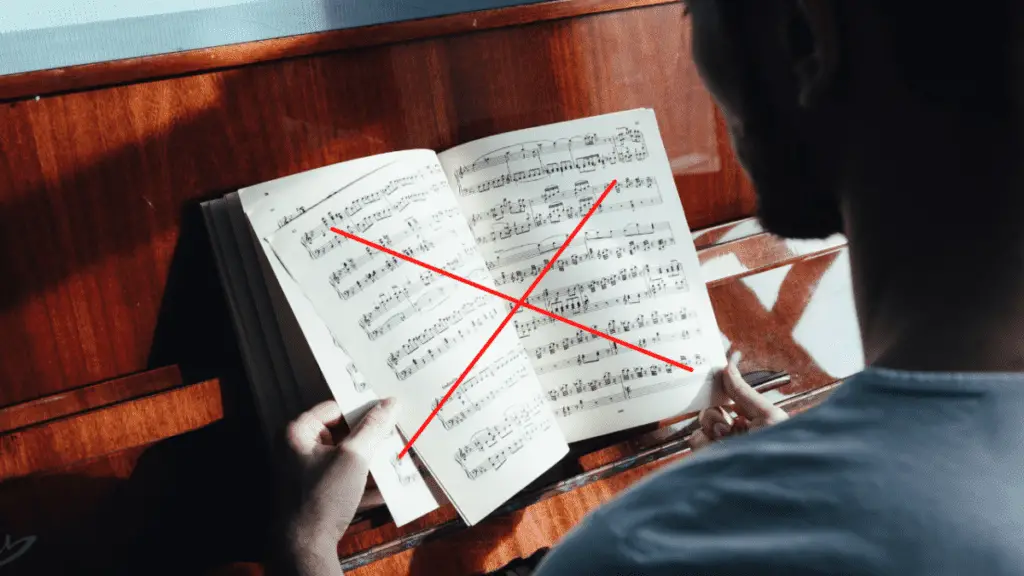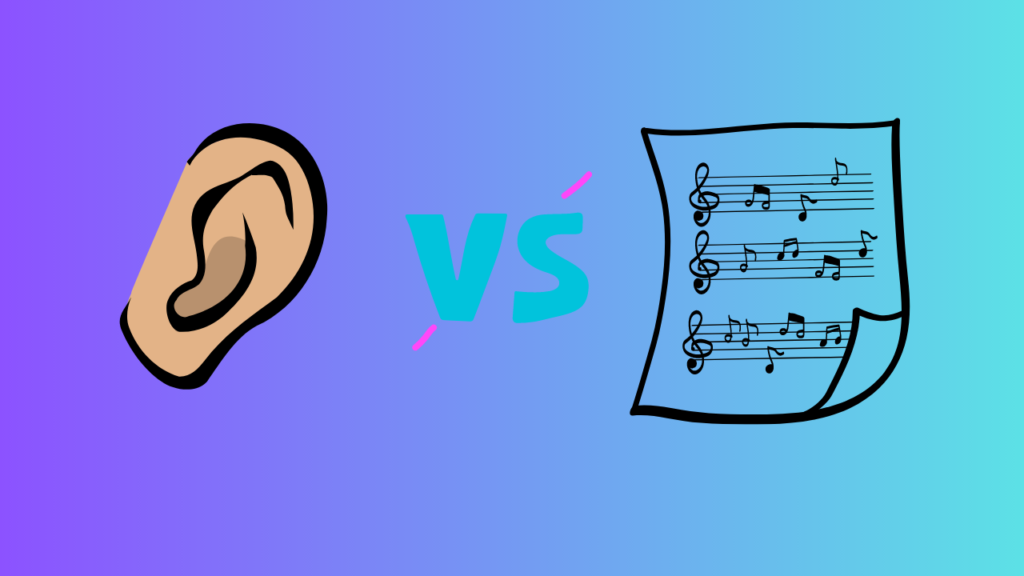This post contains affiliate links.
For many people, learning to read sheet music is as challenging as learning a new language. The different notations of sheet music may confuse people and discourage them from learning to play the piano. Knowing so, is there a way to play the piano without learning to read sheet music?

Learn to play by ear if you want to play piano without knowing sheet music. You play by ear by listening to the piece, identifying the chords and harmonies you heard, then playing them on the piano. Playing by ear works well with pop, but you need sheet music if you’re interested in classical.
To learn why playing by ear doesn’t pair well with classical music, check out this article I wrote Should You Learn Classical by Ear?
Continue reading to understand what playing by ear is, why it is a crucial skill for any piano player to learn, and which is better, learning to play by ear or learning to read sheet music.
Can you play piano without learning how to read sheet music?
As mentioned above, the only way to play piano without knowing how to read sheet music is to learn to play by ear.
Technically, there’s another way to play piano without sheet music. It’s by watching synthesia tutorials of the piece on Youtube and looking at which keys are highlighted on the keyboard. However, this is not the proper way to learn piano. You don’t develop skills by copying what you see on screen, so I don’t recommend doing this.
On the other hand, playing by ear is a skill that piano players actively train to improve. Playing by ear is hard because you have to correctly identify the notes and chords by hearing them.
However, because it’s hard, it’s beneficial. Training yourself to play by ear improves your creativity, which will help you down the line if you ever want to learn how to compose your own songs.
Now, playing pop music by ear is easy because many pop songs use the same chords, so if you have listened to your fair share of songs, you’ll know what those chords sound like, and playing them will be easy.
However, you will still need to learn how to read sheet music if you want to learn classical music. You may find it easy playing Satie’s Gymnopedie No.1 by ear, but good luck trying to play Beethoven’s Moonlight Sonata Third Movement by ear! It’ll take years before you can get each note down correctly.
Should you learn to play by ear or learn to read sheet music?
In general, you should learn to read sheet music first before learning to play by ear. Learning to read sheet music is easier and serves as a foundation to develop your other skills, including playing by ear. However, you can learn to play by ear first if it feels more natural to do so for you.

There’s a reason why one of the first lessons a piano teacher teaches to their students is how to read sheet music. It’s a fundamental skill that any piano player should learn. To many, knowing how to read sheet music is as important as learning your ABCs.
Knowing how to read sheet music will serve as a foundation so you can learn music theory and develop your piano techniques. You need to know your sheet music to know your scales and arpeggios, intervals, rhythms, etc. And with that knowledge, you will understand how to improve your skills as a piano player effectively.
If you’re still not convinced about learning sheet music, check out this article I wrote about the many benefits of learning to read sheet music and how it helps improve your skills.
Another reason to learn to read sheet music first: playing by ear is hard. People with perfect pitch can guess notes correctly by hearing them only once, so playing by ear is easy. However, perfect pitch is a rare talent, so for most of us, playing by ear is a skill that may take years to be decent at. Meanwhile, you can learn the essentials of sheet music within a few months.
Also, if you want to learn classical, while you can play simple pieces by ear easily, it’ll be harder exponentially to do the same for more advanced pieces with complex layers and harmonies. For this reason, sheet music is like cheat sheets that show you exactly how to play the piece effortlessly.
So learning to read music is easier than learning to play by ear. Furthermore, learning to read music takes less time than learning to play by ear. You can learn the basic notations of sheet music in as little as a few weeks, as discussed in the article How Long Does It Take to Learn to Read Music?
On the other hand, if you don’t like sheet music because of its rigid structure and prefer the freedom that playing by ear gives, go for it! No hard rule says you must learn sheet music to play piano. If you enjoy playing piano more by playing what you hear on the spot, do that. I tend to play classical more, so I recommend people to read sheet music because of my background.
With that said, even if you learn to play piano by ear, consider learning how to read sheet music at some point because it’s a helpful tool. You can use sheet music to double-check that what you have been hearing and re-creating is right.

